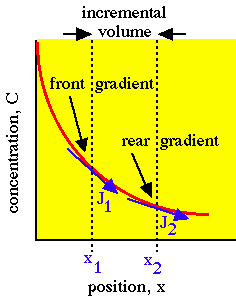
© 1998 Steven L. Jacques, Scott A. Prahl
Oregon Graduate Institute
 |
ECE532 Biomedical Optics © 1998 Steven L. Jacques, Scott A. Prahl Oregon Graduate Institute |
Consider diffusion at the front and rear surfaces of an incremental planar volume. Fick's 2nd law of diffusion describes the rate of accumulation (or depletion) of concentration within the volume as proportional to the local curvature of the concentration gradient. The local rule for accumulation is given by Fick's 2nd law of diffusion:

in which the accumulation, dC/dt [cm-3 s-1], is proportional to the diffusivity  [cm2/s] and the 2nd derivative (or curvature) of the concentration,
[cm2/s] and the 2nd derivative (or curvature) of the concentration,  [cm-3 cm-2] or [cm-5]. The accumulation is positive when the curvature is positive, i.e., when the concentration gradient is more negative on the front end of the planar volume and less negative on the rear end so that more flux is driven into the volume at the front end than is driven out of the volume at the rear end.
[cm-3 cm-2] or [cm-5]. The accumulation is positive when the curvature is positive, i.e., when the concentration gradient is more negative on the front end of the planar volume and less negative on the rear end so that more flux is driven into the volume at the front end than is driven out of the volume at the rear end.

The differential equation for optical diffusion is simply Fick's 2nd law with the substitution of the product cD for the diffusivity  and substitution of F/c for concentration C, although the 1/c factors introduced on both sides of the equation cancel:
and substitution of F/c for concentration C, although the 1/c factors introduced on both sides of the equation cancel:
